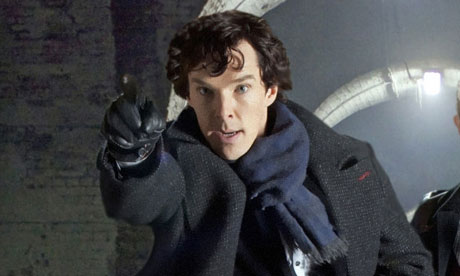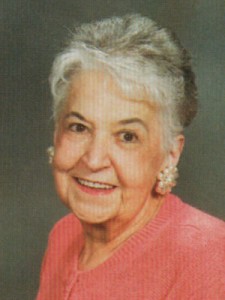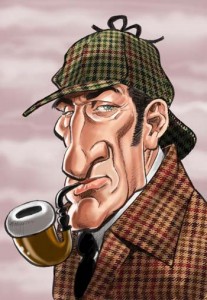 First, a confession: I am a Holmes fundamentalist. I’ve been a rabid fan of Arthur Conan Doyle’s fictional detective for most of my life, and I don’t think the quirky consulting detective needs to be improved. After all, there is a reason why fascination with this character has continued over a century after his creation, and the chances that hacks in Hollywood will do better than ACD did are pretty slim. (By the way, I don’t think Doctor Seuss or Winnie the Pooh need improving, either!)
First, a confession: I am a Holmes fundamentalist. I’ve been a rabid fan of Arthur Conan Doyle’s fictional detective for most of my life, and I don’t think the quirky consulting detective needs to be improved. After all, there is a reason why fascination with this character has continued over a century after his creation, and the chances that hacks in Hollywood will do better than ACD did are pretty slim. (By the way, I don’t think Doctor Seuss or Winnie the Pooh need improving, either!)
But the rule in American movies and television today is imitation, and it was inevitable that Steven Moffat’s amazingly creative Sherlock should be cloned by American TV, and stateside executives would feel compelled to put their thumbprint on the piece, no matter that they were putting smudges on a masterpiece and decreasing its value in the process. As in most cases, mostly what they do is either dumb down the concept, simply misunderstand it, or add an extra coat of mediocrity. This is the process that gave us Robert Downey Jr’s Sherlock Holmes (Warner Bros, 2009) a formulaic costume action movie that bears almost no resemblance to Doyle’s character, and which I could only watch through the subterfuge of pretending that it wasn’t even supposed to be Sherlock Holmes.
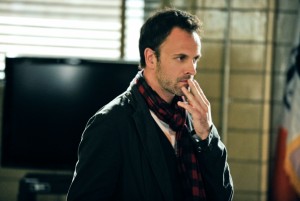 So here is CBS’ Elementary, with the engaging Lucy Liu as “Dr. Joan Watson” and Jonny Lee Miller as semi-recovering addict Sherlock Holmes. The show is actually better than I expected, but that’s just because I expected so little. The trades view it as “a stylish, if kind of boring, procedural.” And that’s spot on. The mysteries themselves are about as good as a decent Columbo, but with the high-concept exaggerated persona of Holmes and Watson sometime aiding, sometimes getting in the way of the story.
So here is CBS’ Elementary, with the engaging Lucy Liu as “Dr. Joan Watson” and Jonny Lee Miller as semi-recovering addict Sherlock Holmes. The show is actually better than I expected, but that’s just because I expected so little. The trades view it as “a stylish, if kind of boring, procedural.” And that’s spot on. The mysteries themselves are about as good as a decent Columbo, but with the high-concept exaggerated persona of Holmes and Watson sometime aiding, sometimes getting in the way of the story.
Elementary casts Holmes as a semi-recovering addict whose father has hired Watson (a failed and self-tortured surgeon) as a 24/7 live-in recovery minder. The A.A. meetings that Watson forces Holmes to attend are hackneyed caricatures of the real thing. Holmes is slightly more than two-dimensional, but not much. Where Moffat (who clearly “gets” Holmes) uses the classic Holmesian details with new twists in the 21st century, Robert Doherty tosses in the violin, the addiction, and other touches in with a bit of a heavy-handed thud.
Rarely, there is someone who not only “gets” Holmes but writes with great creativity. Steven Moffat is in that small league.
Holmes pastiches have been around for most of the last century, and mostly they fall into two categories: either pretty good or embarrassingly bad. The writer who “gets” Holmes and can write in character may do a workmanlike job of spinning another Holmes tale for the genre. Once in a while, rarely, there is someone who not only “gets” Holmes but writes with great creativity, and creates a new niche of Holmesiana. Carole Nelson Douglas did this with the Irene Adler novels, and the amazing Laurie King has done this stupendously well with the wonderful Mary Russell novels. Steven Moffat is clearly in this small league of extraordinary writers. But a great many pastiches are simply flops. Anne Perry, a marvelous writer, penned a perfectly awful Holmes short story that I could just barely finish. I love her William Monk and Thomas Pitt novels, both set in the same period of Victorian England, but she missed the mark utterly when trying to write Holmes. Perhaps that reveals how hard it is to do this!
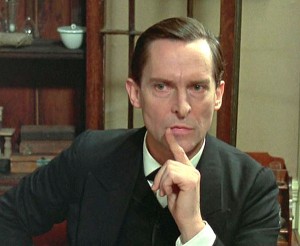 By the way, the quintessential portrayal of the classic Holmes on television has to be the incomparable Jeremy Brett (The Adventures of Sherlock Holmes, 1984-1994 Granada Television series), whose abrupt, quirky characterization accurately captured the tension and complexity of the Holmes of the classic stories in a way few others have done. This is an area of huge competition, since the cast of other actors who have had a stab at Holmes is amazing, ranging from John Barrymore and Peter Cushing to Christopher Lee and Peter O’Toole. Read the LIST OF ACTORS WHO HAVE PORTRAYED SHERLOCK HOLMES.
By the way, the quintessential portrayal of the classic Holmes on television has to be the incomparable Jeremy Brett (The Adventures of Sherlock Holmes, 1984-1994 Granada Television series), whose abrupt, quirky characterization accurately captured the tension and complexity of the Holmes of the classic stories in a way few others have done. This is an area of huge competition, since the cast of other actors who have had a stab at Holmes is amazing, ranging from John Barrymore and Peter Cushing to Christopher Lee and Peter O’Toole. Read the LIST OF ACTORS WHO HAVE PORTRAYED SHERLOCK HOLMES.
If you’re a die-hard Holmes lover like me, then Steven Moffat’s Sherlock , with Holmes portrayed by actor Benedict Cummerbatch, is required viewing. Moffat is probably the most creative writer in television today, a man who has actually come up with some truly new and never-before-thought-of twists in a genre mostly filled with hackneyed imitation. He grasps the essential core of the characters of Holmes and Watson, takes those fully and completely and aggressively into the year 2012, and goes to town. Elementary, on the other hand, is a fairly ordinary police procedural dressed up in Holmes clothing, something I will watch if I have nothing more urgent to do, but it is clearly not “destination television.”
Meh.
Season 3 of BBC Sherlock, starring Benedict Cummerbatch,
will air on Masterpiece Theatre sometime in 2013.


